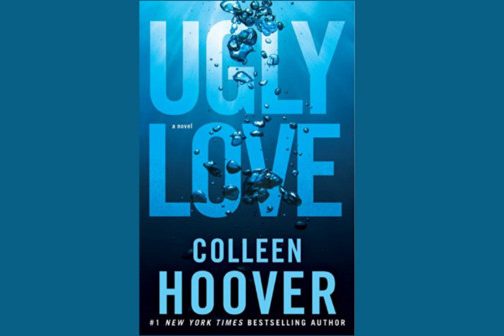Colleen Hoover novel romanticizes toxic relationships

Simon & Schuster
Colleen Hoover’s novels have achieved praise and popularity on social media. However, “Ugly Love” depicts a toxic relationship in an overly-romanticized way.
December 12, 2022
“It’s the beautiful moments like this that make up for the ugly love,” says protagonist Tate in Colleen Hover’s novel “Ugly Love” — but do they really make up for the ugly love, or is Ms. Hoover spreading a negative message about remaining in toxic relationships to young women everywhere?
“Ugly Love” by Colleen Hoover tells a story of a woman falling in love with an emotionally unavailable man. The chapters in the novel switch between two perspectives: the man, Miles, from six years ago, and the woman, Tate, in a current-day perspective. Throughout the novel, readers see Tate being mistreated by Miles, while simultaneously learning why he treats her the way he does through learning the circumstances of his past as the novel progresses.
While the novel takes on an interesting and engaging structure, the story normalizes and represents a rather belittling cliché of emotionally abusive men and complacent women, accompanied by stagnant character development.
The overtly toxic masculine power in the novel is depicted as normal, alongside other negative ideas such as domestic abuse, alcoholism and unhealthy coping mechanisms. Ms. Hoover designs Tate as a character entirely dependent on Miles for any development, and any change in her character is only seen through her feelings toward Miles. The reader does not get to learn of her attributes as a person independent from him.
Furthermore, the power given to Miles in their relationship is heavily romanticized. From the very beginning of their relationship, his dominance is visible. He tells her there are going to be two rules for their relationship: the first that she can’t ask about his past and the second that she can’t expect a future from him — their relationship must remain purely sexual.
The ending of the novel with Miles’ chapter is somewhat of a plot twist, where it’s revealed what event in the past triggered Miles to turn into such a cold person in the present. However, the story is told as if his past should allow the reader, and Tate, to excuse all his emotionally abusive behavior — which only further perpetuates the idea of women allowing themselves to be mistreated.
While the misogynistic tropes in the novel are distasteful, the structure is interesting. The reader learns about Miles through the flashback chapters as he and Tate engage in a relationship. However, it would have been far more interesting if there was nearly as much development in the current-day plot as there was in the flashback chapters of Miles’ past, instead of the current-day chapters which simply recycle the same ideas of Tate being head-over-heels for Miles while he mistreats her in every. single. chapter.
Ms. Hoover’s choices are confusing to the reader, both in writing style and the ideas she presents. Her writing is generally rooted in dialogue with not much exposition aside from that describing Tate’s intense feelings for Miles. Sometimes this style will inexplicably become poetic, with no reason to do so. Further, given that she has a generally young, teenage audience, her choices can contribute further toward a negative mindset for the teenagers worldwide reading her novel. Such choices include depicting such toxic behavior as normal without ever mentioning the slightest idea of healthier coping mechanisms for Miles’ drinking or trauma, or for Tate’s self-deprecating love for Miles.
“Ugly Love” tells a cliché story of women allowing men to stomp all over them, and depicts toxic male behavior as normal — setting a terrible example when it comes to healthy relationship dynamics. There is a difference between telling a story of toxic love and portraying it as toxic and unhealthy, versus depicting a toxic relationship and describing it as both romanticized and normal.




























































Renata • Mar 2, 2023 at 12:55 pm
Brilliant! I’m 29yo and I read Colleen for the first time this year, mine was “This is how it ends”. I have a feeling that although the writer may have good intensions while writing this type of books, the message she delivers is very much the opposite, especially for the young or young adults. The interpretation is indeed a romanticized and normal one, and it disturbs me.